Hong Kong protest leader Joshua Wong says hunger strike 'only way'
STORY HIGHLIGHTS
- Teen protest leader Joshua Wong declares hunger strike
- NEW: He tells CNN it's the "only way" to pressure the government
- Hong Kong chief executive responds: "Take care of your health"
- Occupy founders announce surrender to police
Hong Kong (CNN) -- Hong Kong's teenage protest leader Joshua Wong has begun a hunger strike with two members of his youth activist group Scholarism in his latest attempt to secure talks with the government to demand democracy.
"I know it is really harmful to my body, however it is the only way to give pressure to the government to get a meeting with us," Wong told CNN.
"If the government can have a proper meeting with Scholarism to discuss whether political reform will be launched immediately, we will stop the hunger strike."
The 18-year-old activist wants open elections for Hong Kong's next leader, but Beijing has said Hong Kong may only hold elections if candidates are nominated by a small committee.
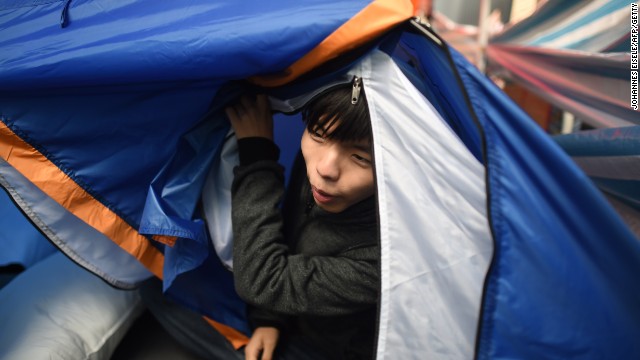
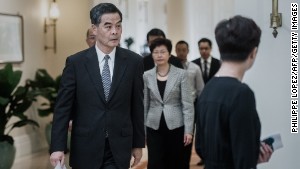
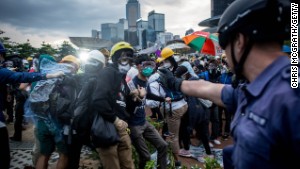
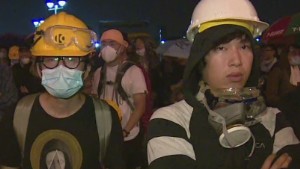
Wong's hunger strike is an attempt to rally a movement which has shown growing signs of fracture.
Protesters have camped more than two months on an eight-lane highway in Hong Kong's Admiralty district, but the government has shown no willingness to make concessions. The movement's momentum has sputtered and leaders of different protest groups are split over what action to take.
Hong Kong's chief executive C.Y. Leung responded to news of the hunger strike by telling students to "take care of their health, especially in this cold weather."
The city's temperature has dipped to a crisp 15 degrees Celsius (59 Fahrenheit) after months of heat and humidity. Wong says he will only consume water.
'We are all tired'
Reactions were mixed to Wong's announcement of the hunger strike.
"Kid, you're too young. You think (Hong Kong's leader) will give you real universal suffrage because of a hunger strike?" said one commenter.
Other democracy supporters accused Wong of staging the hunger strike as a way of achieving a "glorious retreat" without accomplishing anything.
An online statement issued by Scholarism, acknowledged the hunger strike was a desperate measure. "We are all tired, our hearts are weary; as we face this high wall of a government we are like a weak, frail, egg," it said.
"But we are not afraid of people laughing at our dreams; we are afraid of hearing the sounds of our broken dreams in the future, afraid of having no more dreams at all."
Scholarism is not new to hunger strikes: In 2012, members of the group staged a hunger strike outside Hong Kong's government headquarters to oppose a proposed pro-Communist high school curriculum.
After vocal protests from thousands of supporters, officials eventually withdrew the plan.
Occupy founders announce 'surrender'
Not long after Wong's hunger strike began, the three middle-aged founders of the Occupy Central movement announced they would not escalate their actions, but would instead surrender to police.
"For the sake of the occupiers' safety, for the sake of our original intention of love and peace, as we prepare to surrender, we three urge the students to retreat," law professor Benny Tai announced at a press conference.
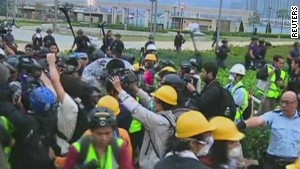
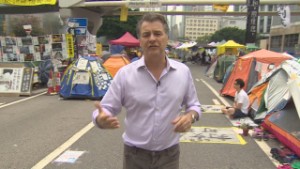
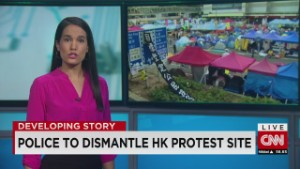
Tai first came up with the idea to "occupy" downtown Hong Kong to call for universal suffrage but he has not always seen eye-to-eye with students leaders, who kicked off the current protests two months ago.
Many of Hong Kong's committed protesters do not consider the Occupy founders to be their leaders, and are unlikely to be influenced by Tai's call for retreat.
Wong told CNN if the Occupy founders want students to retreat, then "(the Occupy founders) should urge the government to get a discussion with the students."
Standoff
Student leaders have grown increasingly desperate for a breakthrough. On Sunday night, student leaders called on supporters to surround Hong Kong's government headquarters Sunday night, leading to a violent nighttime standoff with police in which protesters were bloodied and ultimately beaten back.
The next morning, police briefly moved on the main protest site, removing some tents, banners, and barricades before withdrawing.
Student leader Alex Chow, 24, of the Hong Kong Federation of Students bowed his head in an apology to supporters Monday.
"We aimed to disrupt the operation of the government... but the plan had room to improve and in a sense it failed."
Before dawn Monday, at least 40 arrests had been made in Admiralty, according to the Hong Kong Police. A further 12 people were also arrested in Mong Kok.
The Central Government Office was closed on Monday morning but later re-opened.
The government said it condemned "violent radicals," saying they had "provoked and verbally abused police officers" and encouraged others to charge police lines.
Protesters: "We do not have any plan'
Wong was briefly arrested last week as police forcefully cleared Hong Kong's second-largest protest site in the working class neighborhood of Mong Kok. Now as the main protest site comes under threat, protesters have been at a loss for how to best respond.
Arguments broke out Monday between student leaders and demonstrators after police made an incursion into the tent city. Winnie Ng, a demonstrator, told CNN "We do not have any plan."
Grassroots demonstrators have argued the movement should escalate its physical confrontations with the government.
But the orginators of the Occupy movement, among them Benny Tai and professor Chan Kin-man, have repeatedly called on students to withdraw and think of a new strategy, citing opinion polls that show low support for the street occupations.
No comments:
Post a Comment